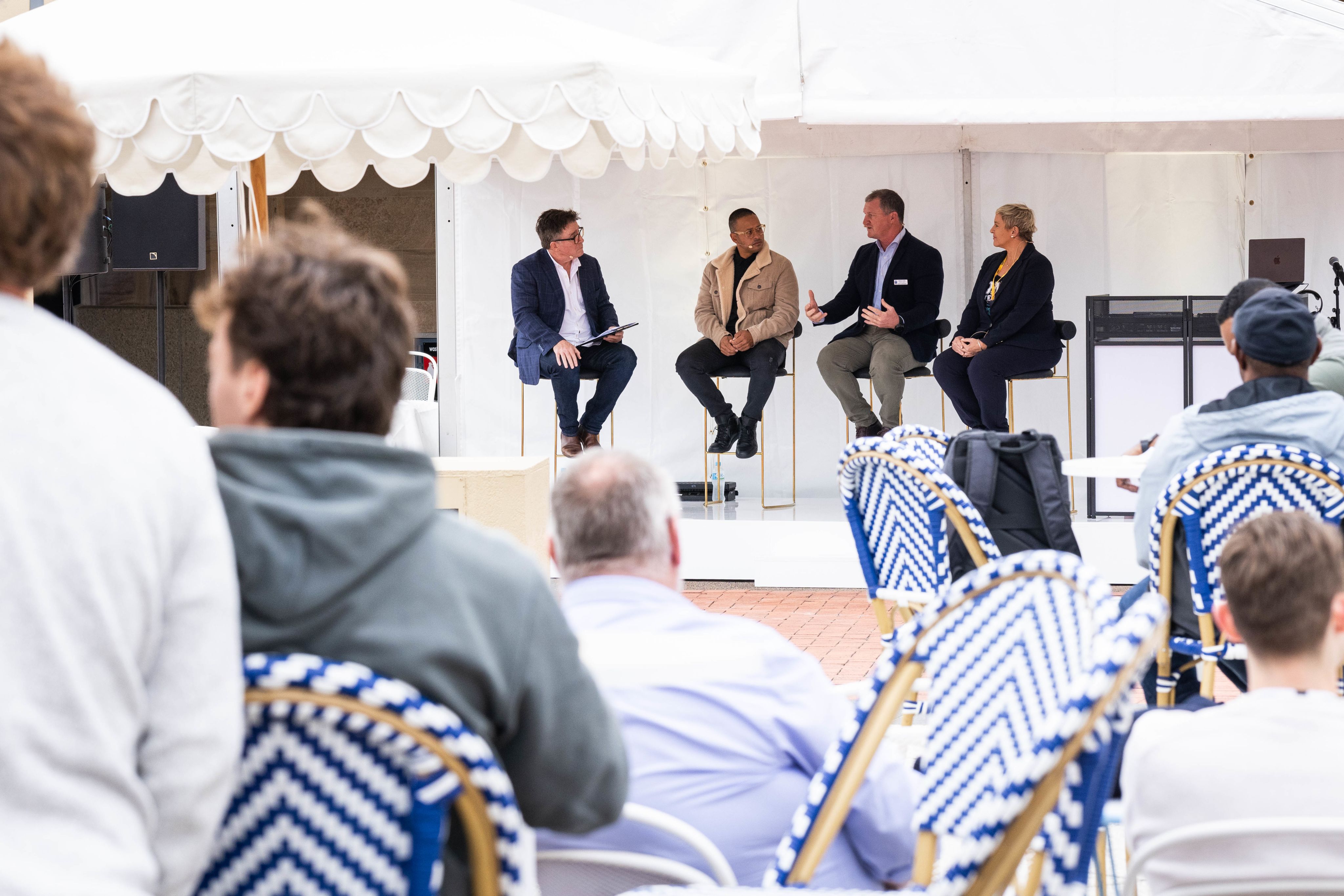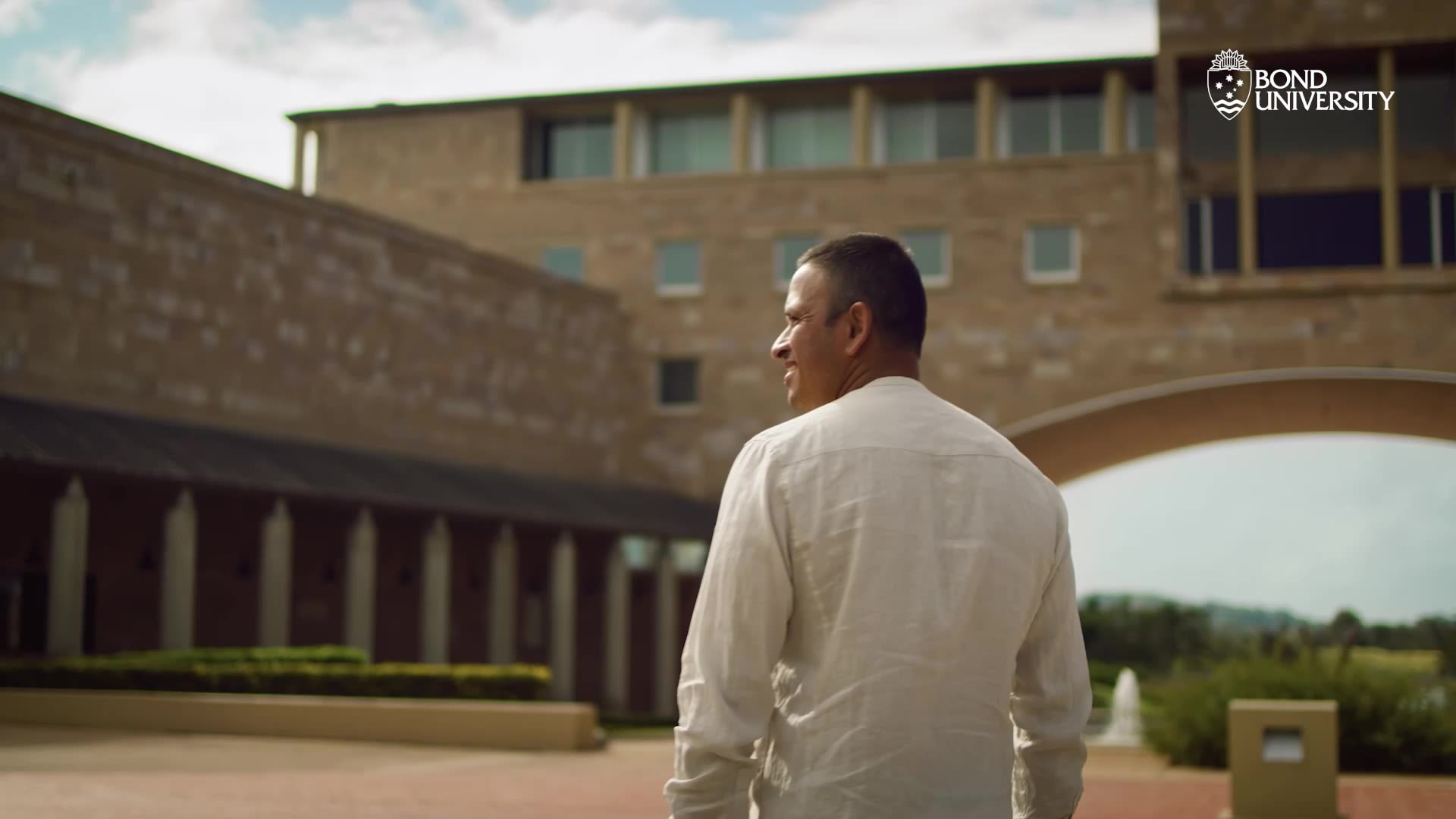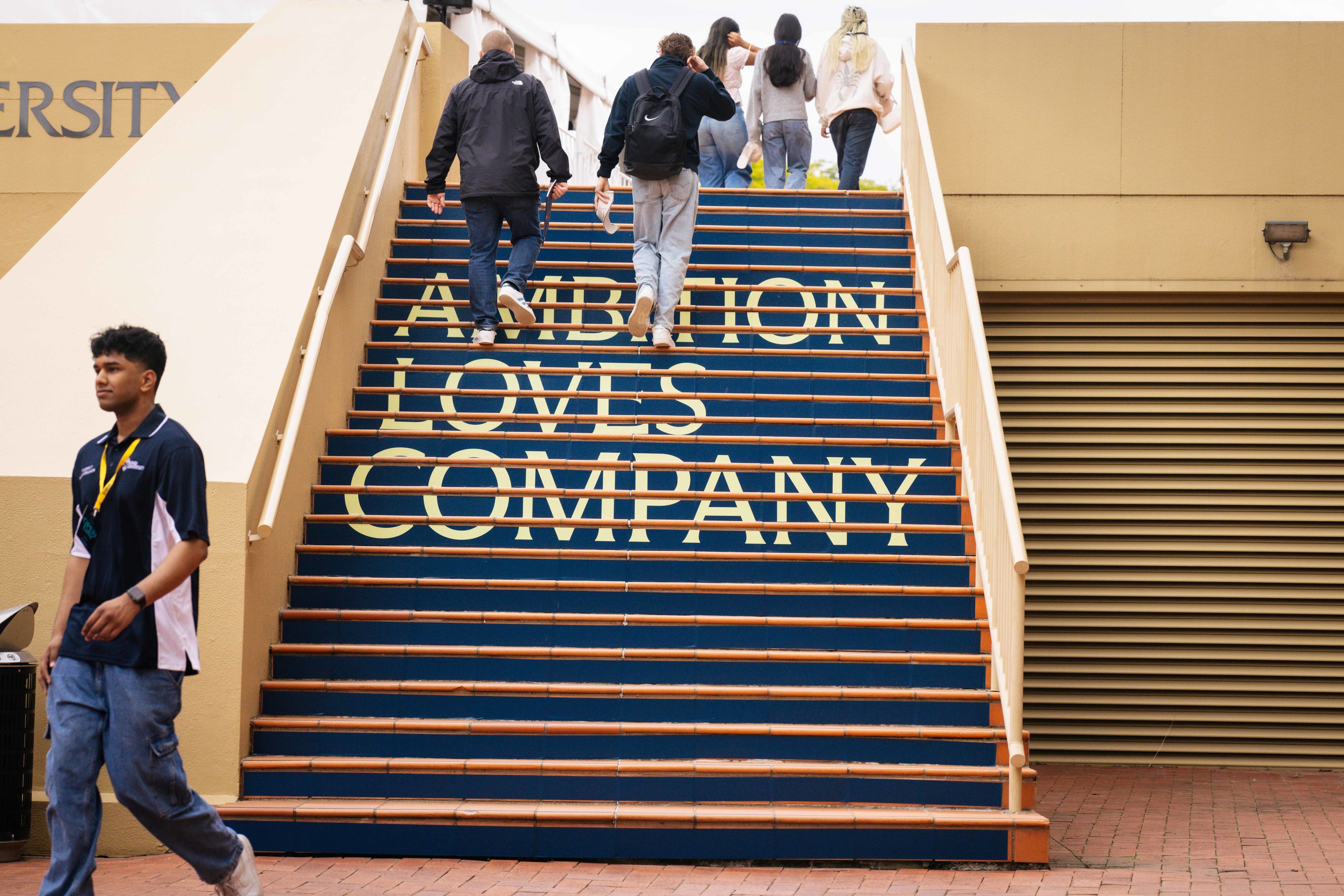

The sport industry is undergoing rapid transformation, driven by technology, shifting cultural interests, and educational pathways. At Bond’s Open Day, three experts from different backgrounds and perspectives shared the forces reshaping the field and the opportunities emerging for the next generation.
One is a professional athlete and household name. One is a former rugby player turned university sport executive. And one has decades of experience in the highest levels of sport management. What they all have in common is a passion for sport – as an industry, a vehicle for change, and a cornerstone of community. At Bond Open Day, Usman Khawaja, Dr Lisa Gowthorp and Michael Collins joined journalist and broadcaster Matt Webber on stage to discuss the changing shape of sport – and what it means for the next generation of aspiring athletes and professionals. Follow excerpts from their panel discussion.
Meet the panellists
Matt Webber
Our host Matt Webber is Bond University’s Broadcast Manager. He’s a lawyer, author, and podcaster. Before joining Bond in 2023, he spent more than a decade hosting Mornings and Drive programs on ABC radio.
Usman Khawaja
A left-handed top order batsman, Usman Khawaja became the first Muslim and first Pakistani-born Australian to receive an Australian Cricket Test baggy green cap. He is also the founder of the Usman Khawaja Foundation, a not-for-profit that supports the aspirations of youth through sport and education, and is particularly passionate about diversity and inclusion in sport. Usman is currently studying an MBA at Bond.
Michael Collins
Michael is a former professional rugby player who moved into sports administration following a glittering playing career in New Zealand and the UK, including as captain of Waikato. After a stint as CEO of Taranaki Rugby, he was appointed CEO of the Chiefs Super Rugby Club, and during his tenure, the club featured in finals in four out of five years. Michael is currently Bond’s Director of Sport.
Dr Lisa Gowthorp
Lisa is an Associate Professor of Sport Management at Bond and the Associate Dean for External Engagement in the Business School. Lisa has worked in high performance sport for decades, in organisations including the Australian Institute of Sport and Paddle Australia. She has managed sport teams at world championships and Olympic Games, and undertakes research in high performance sport, governance and policy.
What opportunities are emerging for students wanting to work in the sport industry?
LISA: The biggest immediate opportunity is Brisbane 2032, the Olympics. That’s now seven years away and there are going to be so many roles in the Games. The Games are in South East Queensland, where pre-training camps and competitions leading up to the Games will soon commence, and will require staff and volunteers at events, within facilities or in sport organisations. Even now there are events on every weekend in sport and it is a huge industry.
And in the lead up to 2032, opportunities are going to be expanding for students here, not just in business or sport management but in physiotherapy,occupational therapy,nutrition and dietetics and exercise and sports science.
We encourage students to get out into industry from the very beginning of their degrees. We send them to gain experience in organisations such as Swimming Australia, to events such as the Gold Coast Marathon and to volunteer at professional football matches like the Titans and the SUNS. Our students leave with so much work experience and a clear idea of the future they want in sport.
In your opinion, what is the biggest disruptor in the sport industry?
USMAN: Technology is, by far, the factor that’s changed sport the most in recent history. When I started, there was no social media, the world wasn’t as connected, and if you wanted to work in sport – as an athlete or professional – it was as though you had to look inside Australia. This shift is going to create a lot of opportunities for young people who want to work in sport.
When it comes to cricket, artificial intelligence (AI) is making a huge impact. Technology is impacting the way the game is played, the way umpires are making decisions. Everyone is looking at ways to make better decisions and have better outcomes for the game.
LISA: Technology and science behind sport is changing every day. To Usman's point about looking at ways to make better decisions and have better outcomes for the game, data analytics is becoming really important. Working in sport management, our role is to get the coaches and athletes performing best they can so we need to embrace it and be across how to use data and analyse it to get the best out of teams and athletes.
MIKE: Sport has had to change, but I think it’s a really positive thing. These days, we are exposed to and cater to so many different sports and recreational experiences – things we didn’t even imagine 20 years ago. Pickleball is a great example. As Director of Sport, I’ve seen how much the university invests into catering to the latest sport trends or interests to ensure that at the elite level and grassroots level. Sport is a really big part of the student experience.

What skills do aspiring sport management professionals need to succeed, and how is Bond enabling them?
LISA: What’s fantastic about sport is it’s not like a normal business. There’s passion. And athletes and coaches are a special breed. To manage those organisations, or to manage sport, takes a lot of skill and a lot of personal skills. It’s about relationships. I think at Bond, because our classes and our forums are really small, we engage our students from day one to build those skills to have conversations, build relationships. If you have those skills, your degree in sport management can take you anywhere in the world.
MIKE: Having partnerships with organisations is something we pride ourselves on, beyond the athletes themselves we understand the value of the professional partnerships so students can be provided with internships, placements and opportunities. Here at Bond we have a great partnership with the Brisbane Lions, a relationship with the Gold Coast SUNS, the Brisbane Broncos and lots of the Super Rugby clubs across Australia and New Zealand. Partnerships in professional sport create experiences for students who want to work in sport through learning opportunities as well as employment.
What is your advice for aspiring athletes?
USMAN: As a sportsperson, you can only really play for 10 to 15 years. You need to maximise that growth for yourself, but I think you also need to use that opportunity to make the game and industry better for the next players. To me, there’s more than just cricket. What can I do to help people outside of the game, in the community?
MIKE: I tell the student-athletes coming through that they can’t be afraid of making mistakes. You can’t be afraid of losing. As an athlete, you’re naturally competitive, you want to win. But sometimes, losing teaches you more. I think sometimes, when athletes retire from professional or elite sport, they become really scared of making mistakes or losing and that can be challenging when you’re adjusting to your new career or stage of life. We try and encourage our athletes here to make mistakes and learn. Let’s learn the lesson and move on.

Usman, what has studying an MBA taught you about cricket?
USMAN: Now that I’m at Bond, doing my MBA and completing finance subjects, I’ve learnt a lot of skills that help me in my role with the Usman Khawaja Foundation and on the board of the Australian Cricket Association. I can read the financials, I can see where revenue is being made, where it’s being spent. That empowerment has been really cool – there's no better feeling than the empowerment of knowledge.I find it really satisfying that I can actually look at businesses and corporations and all these things from a different lens, which I’ve never been able to do before.
I can see the potential for cricket and the potential impact of getting more kids involved in sport, more women involved in sport, from a broader perspective rather than just being an athlete on the field.
And what's next for you?
USMAN: I’ve been very lucky that I got to play cricket. I became a professional cricketer by the time I was 20. After my career, I want to spend time with my family. I’ve been able to play sport for a long time and I’ve been able to create a beautiful life for myself and my family, and I want to give time back to them. Give time back to my community and give back to the game.
Published on Wednesday, 13 August, 2025.
Original thinking direct to your inbox

Stories from Bond

